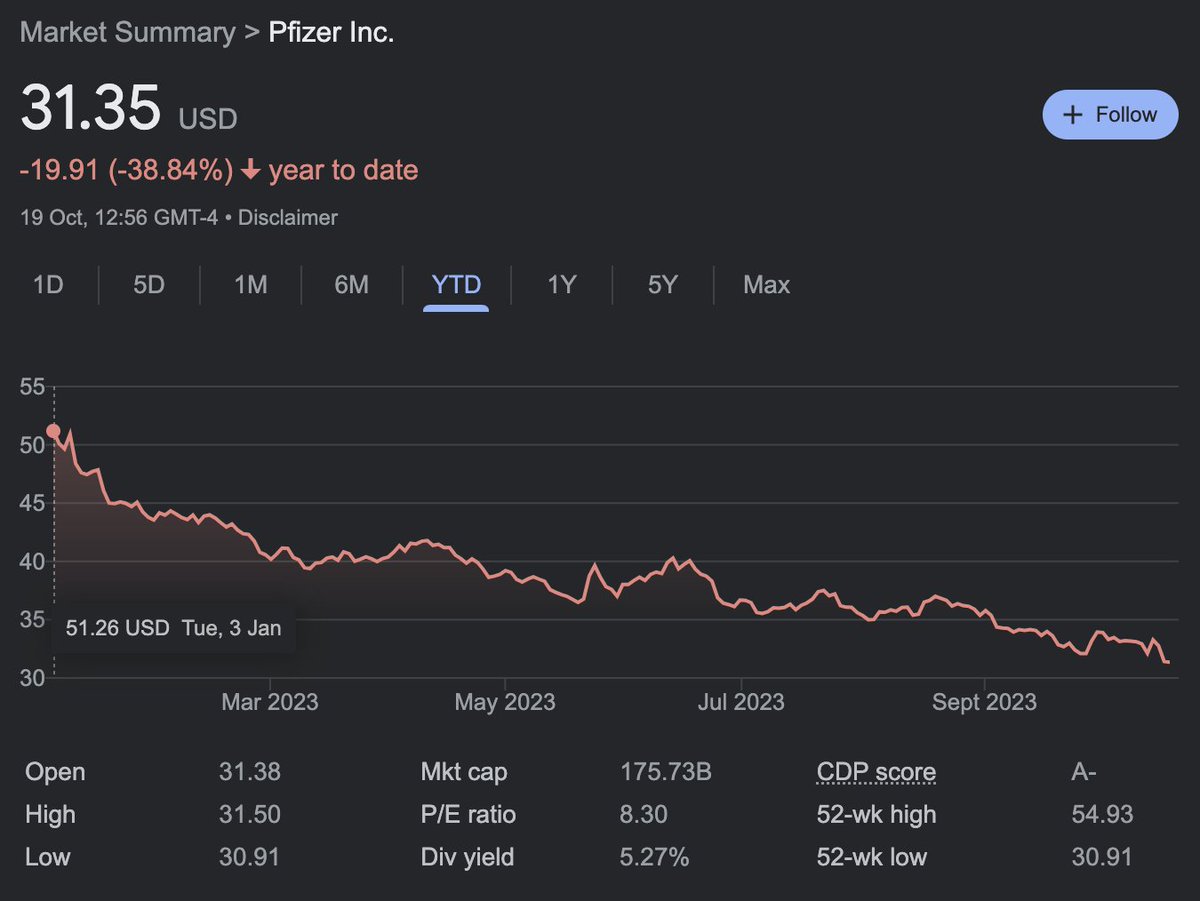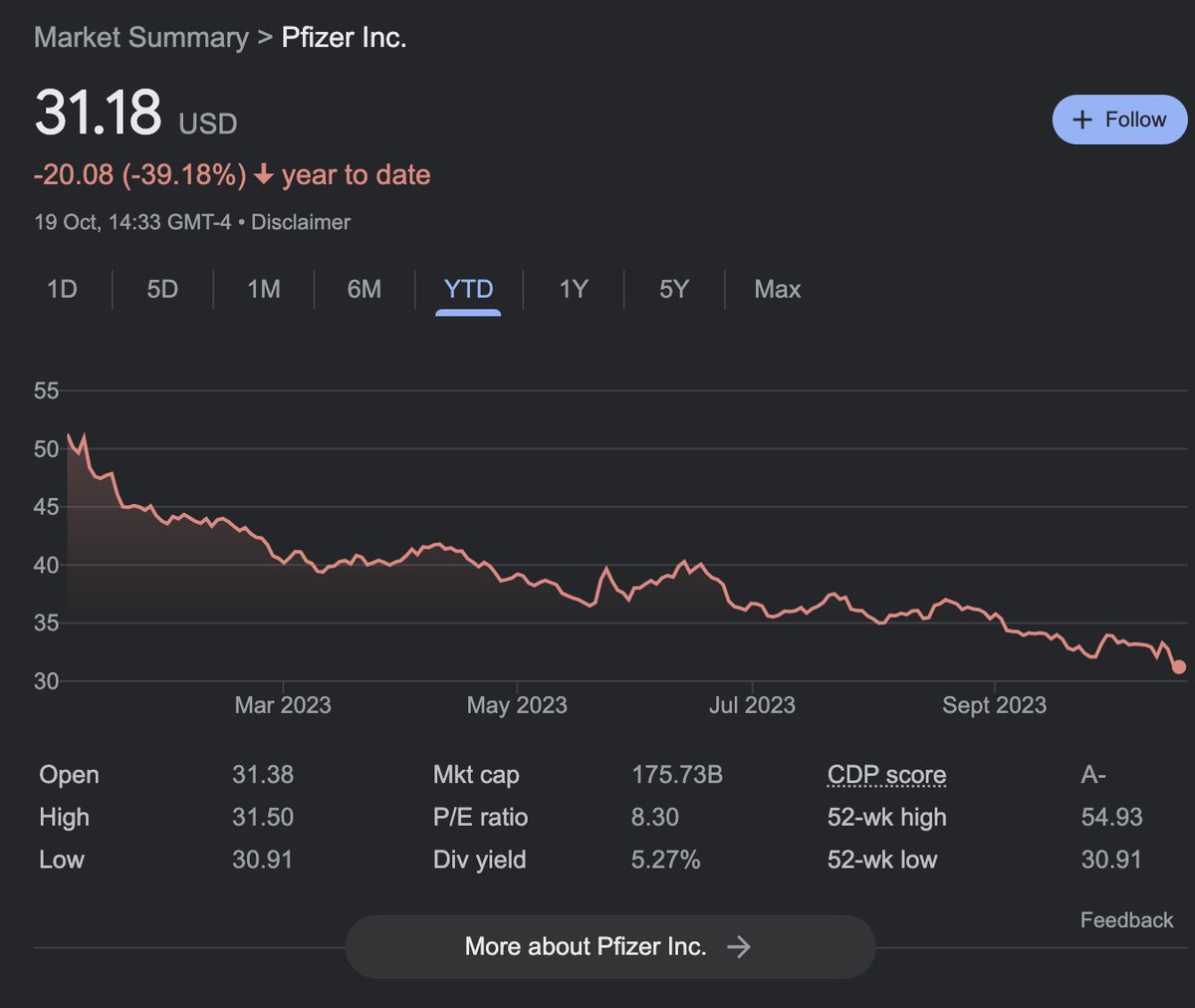Pfizer's stock is getting absolutely hammered, and I'll summarise one explanation as to why.
Pfizer gave your regulator data on their mRNA product in the hope to get it to market. The data impressed your regulator, and in a slight panic, your regulator approved it
However...🧵
Pfizer gave your regulator data on their mRNA product in the hope to get it to market. The data impressed your regulator, and in a slight panic, your regulator approved it
However...🧵

The data Pfizer gave was only relevant to their 'Process 1' mRNA product. Their 'concept car' basically.
The mRNA product finally shipped to your health service and injected into arms was made in a very different way, it was called 'Process 2' or the 'commercial process'
The mRNA product finally shipped to your health service and injected into arms was made in a very different way, it was called 'Process 2' or the 'commercial process'

To use an analogy by @NickHunt5 imagine the difference between baking cakes in your kitchen and then scaling it to bake millions of cakes in a factory. There's a lot that can and does go wrong. But the microscopic world of mRNA is a great deal more complicated than cakes...




So the regulator quietly asked Pfizer to provide data that would demonstrate these new 'commercial process' mRNA products were of a similar safety standard to the 'Process 1' mRNA they had approved.
The EMA discuss it here:
So what are they saying...? ema.europa.eu/en/documents/a…

The EMA discuss it here:
So what are they saying...? ema.europa.eu/en/documents/a…

To paraphrase; "since we don't have safety data on the commercial product, we'll trial it by comparing its side effects against those known to be caused by the clinical product. If there's no difference then we know the commercial product is safe"
A sensible and vital request...
A sensible and vital request...

Not only did this data not materialise before the 'commercial process' mRNA was rolled out, it never appeared at all!
@joshg99 and @NickHunt5 did great work on this. Josh spotted Pfizer's "Bait and Switch", and Nick FOI'd the regulator for the crucial safety data they promised
@joshg99 and @NickHunt5 did great work on this. Josh spotted Pfizer's "Bait and Switch", and Nick FOI'd the regulator for the crucial safety data they promised
Initially, the UK regulator denied the FOI request to see the data proving the commercial product was safe, but after @NickHunt5 pursued them further, @MHRAgovuk finally admitted that no such safety data exists.
The data 'is not held' they said.
The data 'is not held' they said.

How did the regulator try to justify this?
By arguing that safety was implied because lots of people had used the product.
These language acrobatics blur a simple truth; the safety of the commercial product was determined by testing it on the public
By arguing that safety was implied because lots of people had used the product.
These language acrobatics blur a simple truth; the safety of the commercial product was determined by testing it on the public

They didn't compare it to the clinical product, but @joshg99 found a sample in the Pfizer data, and he ran some numbers himself... it didn't look good.
Check this thread:
So...what does this mean?

Check this thread:
So...what does this mean?
https://twitter.com/joshg99/status/1705177305499279525

Let's be crystal clear. The product being injected into millions across Europe and beyond was *different* to the one approved using the clinical trial. From a regulatory perspective, these were different products.
The regulators approved crab, but they rolled out crab sticks.
The regulators approved crab, but they rolled out crab sticks.

To be fair, the regulators said that 'side-by-side comparability studies' were done. To researchers, perhaps FOI these studies?
Maybe the regulators eyeballed it, and the crab sticks were fine? Well @joshg99's analysis says no, which brings us back to Pfizer's stock price 📉
Maybe the regulators eyeballed it, and the crab sticks were fine? Well @joshg99's analysis says no, which brings us back to Pfizer's stock price 📉
It's is down nearly 40% for the year.
Demand for their commercial mRNA product is dropping like a stone - it seems something has changed in America's mindset, booster uptake is very low despite CDC recommendations.
Why might this be?
forbes.com/sites/antoniop…


Demand for their commercial mRNA product is dropping like a stone - it seems something has changed in America's mindset, booster uptake is very low despite CDC recommendations.
Why might this be?
forbes.com/sites/antoniop…


Lets go back to that commercial product, rolled out to millions, and how it differs from the one they tested during the clinical trial.
Crab vs crab sticks.
Well, in April of this year, @Kevin_McKernan used some of Pfizer's 'commercial product' as a control in a lab test...
Crab vs crab sticks.
Well, in April of this year, @Kevin_McKernan used some of Pfizer's 'commercial product' as a control in a lab test...
To his surprise, he found they were contaminated with DNA. Some vials contained significantly more DNA than regulations allow, and the findings are consistent. More and more researchers are finding the same contamination in the commercial mRNA product.

https://twitter.com/Kevin_McKernan/status/1714032942748705043

His findings were shared with the FDA in a very competent '2 minute' presentation by @Kevin_McKernan at an FDA open hearing. It's very dense, very technical, and its not aimed at the public, but as a warning to @US_FDA it was very powerful.
Reaction? 🦗

Reaction? 🦗

No one took Kevin seriously. DNA contamination in the vials?! Impossible surely!?
Well, another researcher at @UofSC, @P_J_Buckhaults skeptically tested the vials for himself. To his surprise, he found that @Kevin_McKernan was right, the commercial product is contaminated.
Well, another researcher at @UofSC, @P_J_Buckhaults skeptically tested the vials for himself. To his surprise, he found that @Kevin_McKernan was right, the commercial product is contaminated.

What does DNA contamination even mean? @P_J_Buckhaults did a great job explaining this in his presentation to the South Carolina Senate:
If you prefer reading, @MaryanneDemasi did a great interview with @P_J_Buckhaults about it:
maryannedemasi.substack.com/p/exclusive-an…
If you prefer reading, @MaryanneDemasi did a great interview with @P_J_Buckhaults about it:
maryannedemasi.substack.com/p/exclusive-an…
If you want a headline on what it means, the DNA contamination, combined with the unique mRNA technology, creates 'a very real theoretical risk of future cancer' according to a carefully worded testimony from @P_J_Buckhaults at a South Carolina Senate hearing. 

There's an ongoing debate about this. Broadly, it has moved through "Not happening" to "Ok it's happening but it probably doesn't matter"
We're now in strange new territory.
World renowned experts are weighing in on this DNA issue.
And the regulators?


We're now in strange new territory.
World renowned experts are weighing in on this DNA issue.
And the regulators?
https://twitter.com/GeneCollector/status/1706682771492499598


I wrote to @MHRAgovuk to bring the issue to the attention of their defective medicine service. At the time, a third lab (Germany) had just confirmed DNA contamination. I got no response. Not even an acknowledgement. Here's the open letter:
And then....philharper.substack.com/p/open-letter-…
And then....philharper.substack.com/p/open-letter-…
This morning, @Kevin_McKernan and @JesslovesMJK published another paper on this issue - more evidence of DNA contamination in the commercial mRNA products.

https://twitter.com/Kevin_McKernan/status/1714957605762724129

While that debate continues, kept aloft only by public health's increduilty that something like this could happen, the market priced it all in. A contaminated product was pushed on the world, lawsuits and revenue collapse could follow. 💰projections for Pfizer are being slashed. 

For months, the problem was mostly ignored. Researchers like @alexandrosM wondered how long a problem like this would remain out of the zeitgeist.
Had I written to a supermarket to say 'hey, I found glass in your mayo jar' how long before they investigated?
And yet...


Had I written to a supermarket to say 'hey, I found glass in your mayo jar' how long before they investigated?
And yet...


On an issue involving a medical product, at one time recommended to everyone in the country, the @MHRAgovuk simply don't respond to a heads up that their product is defective. Something they can easily test for. Strange indeed... And as for the markets?
They have known for months. So how long until the "Trust the Science" crowd, who have carried water for so long, for this notoriously morally bankrupt industry, despite overwhelming evidence of wrongdoing, how long until they can admit there's is a problem?
Follow, and lets see



Follow, and lets see



• • •
Missing some Tweet in this thread? You can try to
force a refresh

 Read on Twitter
Read on Twitter







